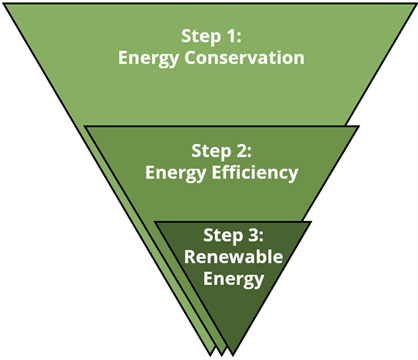A Net Zero Home
Did you know that around 40% of the carbon dioxide we produce in Mid Sussex comes from or homes/houses? Reducing the carbon footprint of our homes is therefore an important part of our journey towards net zero.
When our homes burn fossil fuels like gas or oil for heating, or draw power from the electricity grid, they generate carbon emissions. You can calculate the carbon footprint of your home life using the WWF’s free calculator: WWF Footprint Calculator.
Reducing the carbon emissions of your home can seem complicated. So, the best way to approach it is in three steps often called the “energy hierarchy”.
The Energy Hierarchy

Step One: Energy Conservation – Using less energy
You can start with simple things like turning lights off when you no longer need them, choosing a lower temperature on your washing machine or using the heating controls on your boiler. These small changes will save you money, too.
Step Two: Energy Efficiency
We all have to heat our homes and turn the lights on when it's dark. Your home is always going to use energy. That’s OK. But it's the efficiency of that energy use that’s important.
Making sure your home is energy efficient normally involves technology. So, next time you replace a light bulb, use an LED light bulb. When you buy a new TV, pick one with a good energy efficiency rating. Consider getting loft or wall insulation so your home retains heat better and you can turn the heating off.
Step Three: Renewable Energy
The last step is to consider the source of the energy your home uses. Renewable energy has a much smaller carbon footprint than energy gained by burning fossil fuels.
So, consider installing solar panels on your roof or a heat-pump in your garden to replace your boiler. You need to work out the best solution for your home and your budget. This can be challenging but help is out there. For example, Solar Together is a local scheme that supports group-buying of Solar PV panels for reduced prices.
Check out the Green Home Grants section below for more advice on funding schemes that could support energy efficiency measures for your home.
Waste, Water & Travel
Addressing electricity, energy use and heating are critical to achieving net zero, but there are other important ways to reduce the carbon footprint of your home, too:
- Recycling your waste. See the Waste and Recycling section of this website.
- Reducing your water usage. Follow this link for more information.
- Make the move to an electric vehicle: Swap to an electric or low-emissions vehicle. Follow this link for information on the West Sussex Chargepoint Network: UK’s largest public EV charging project (connectedkerb.com)
- Consider active travel: ditch the car completely if you can walk or cycle.
Green Home Grants
Green Home Grants are Government-funded schemes that help residents upgrade their homes to save energy or use renewable energy.
Click the link below for a list of the Green Home Grant’s available.
Heating and insulation grants - West Sussex Energy
Please note that Mid Sussex District Council does not process or authorise any grants, or work with or endorse any companies or agents promoting energy efficiency or insulation grants directly. For grant-related queries, please contact West Sussex Energy Advice Service as outlined below.
Advice Service
For further advice and guidance please contact the West Sussex Energy Advice Service on:
West Sussex Energy Advice Service
Call: 01243 974063 (Monday to Friday 10am – 4pm)
Email: energy@arunchichestercab.org.uk
Website: Arun & Chichester Citizens Advice - Energy 2023 (arunchichestercab.org.uk)
This service is provided by Arun & Chichester Citizens Advice service working in partnership with West Sussex local authorities. You are guaranteed to be provided with free, impartial, and confidential advice. The service is provided to any homeowner or renter of private or social housing in West Sussex.
For further energy advice, please visit the West Sussex Affordable Energy website and select the ‘advice’ tab’, followed by ‘Mid Sussex District Council support’.
Cost of Living
For advice on Cost of Living, please visit the dedicated support webpage: https://www.midsussex.gov.uk/cost-of-living-support/
More information
- For a simple guide to all things net zero visit: Net Zero Explained
- Check out the West Sussex Affordable Energy newsletter here: Resources - West Sussex Energy
